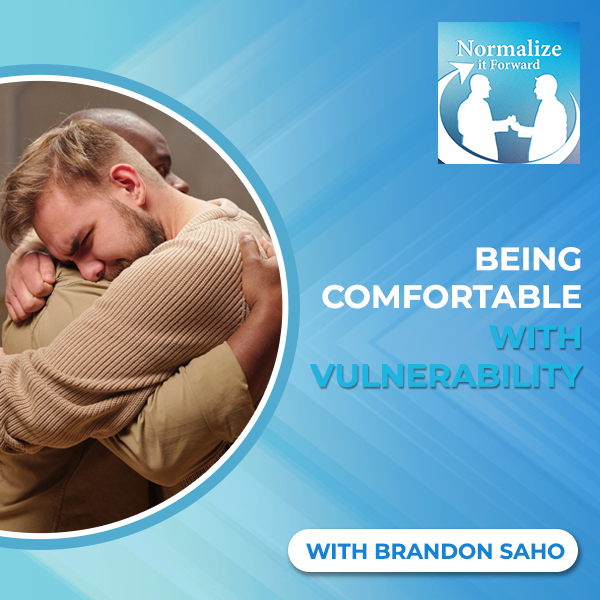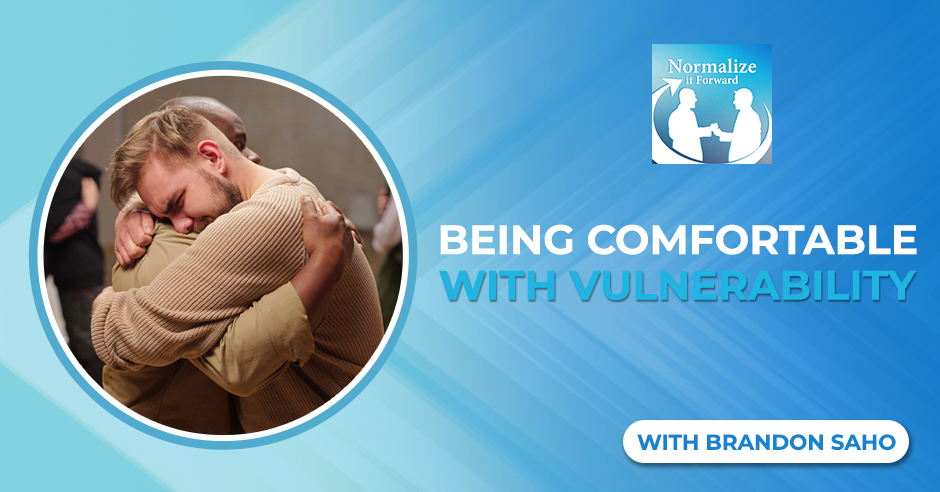
There is so much stigma about mental health that most people refuse to talk about it. Brandon Saho uses his platform The Mental Game to invite people to embrace vulnerability and be comfortable with the uncomfortable. In this conversation with Marc Lehman, he shares how he hosts emotional interviews with athletes and celebrities to raise awareness about the seriousness of depression, anxiety, and trauma. Looking back on his own battle with suicidal thoughts, Brandon also emphasizes the importance of undergoing therapy and seeking support from people you trust.
—
Watch the episode here
Listen to the podcast here
Being Comfortable With Vulnerability With Brandon Saho
We are here to talk openly about mental health and wellness. I am super excited to welcome Brandon Saho. Brandon, how are you?
I’m good. Thank you so much.
Brandon is a sports reporter who had battled depression and suicidal thoughts for years before finally asking for help. In 2022, after beginning therapy and checking into a hospital, he found a new purpose in life to help others. Saho quit his TV job and launched The Mental Game, where he hosts emotional interviews with athletes and celebrities. Guests include actor Terry Crews, former NFL star Chad “Ochocinco” Johnson, rapper Kevin Gates, The Office star Kate Flannery, and many more. Saho’s mission is to save lives with impactful conversations about depression, anxiety, and mental health. Welcome. How are you?
I’m good. I’m feeling good. I’m feeling open. Thank you for creating a platform, having this conversation, and for everything you do as a therapist to help young people who need to know this stuff the most because we weren’t taught it in school. The more we talk, the more we can help each other, so thank you.
Brandon Saho And The Mental Game
Thank you for being here. I’m looking at your picture of The Mental Game. I want to hear more about that because, to me, it’s such an awesome pivot that you’ve made. Through our episode and through our discussion, there’s this ripple that takes effect and hits a lot of different people in such a positive way. Tell us about The Mental Game.
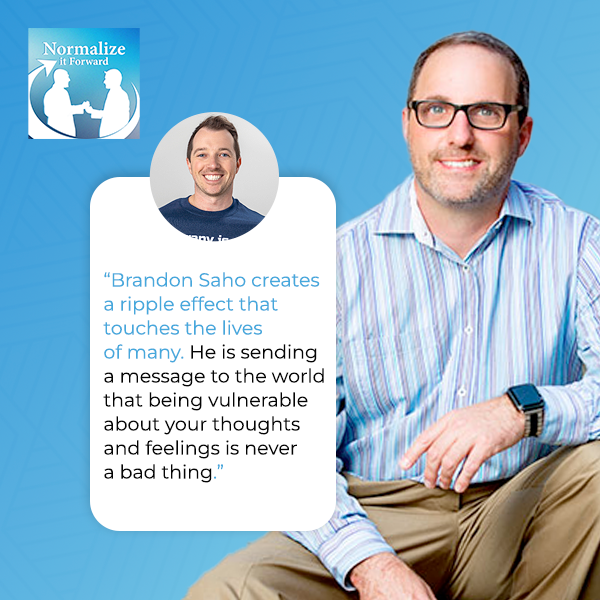
It’s never something that I set out to do. I never had a plan in my life to leave the sports reporter job. That was my dream job that I had, but like a lot of people, I was struggling on the inside and no one knew. I had battled suicidal thoughts off and on from the freshman year of high school all the way up until a couple of years ago. I finally got to this rock bottom moment where I had to ask for help.
I had lost three family members in three months. The woman that I thought I was going to marry and I were going through a tough breakup. I had all this pressure on me at work. I was suicidal every second of every day for months. Finally, I had to start going to therapy, check myself into a hospital, and take care of or try to learn tools to help my mental health for the first time ever in my life.
The Mental Game idea was born in therapy, which is beautiful. We’re on TV like the athletes, except paid 0.0001% of what they make. We’re on contracts and deals. My contract was coming up, and my therapist asked whether I wanted to stay at NBC in Cincinnati and what I wanted to do. I said, “What if we combine mental health and journalism?” That was the idea for The Mental Game.
I started with a Bengals player, Sam Hubbard, whom I’ve been pretty good friends with. He was my test dummy, if you will. It has grown to where we have over 60 episodes. I live in Los Angeles and get to interview with some of the biggest stars in the world. I never thought this is what I’d be doing, but I do feel like it’s my true purpose.
We don’t pay any guests. There’s nothing fake about it. If they want to tell their story, they come on, and we’re able to share that story across the country and across the world. For me, that has been the most powerful thing. It is knowing that we might be able to help somebody out there that’s struggling like I was in silence for fifteen years. If they see their favorite athlete, movie star, singer, or actress talk about it, they’d be like, “They go to therapy. Maybe I can, too.” It has been beautiful to see something that I struggle with privately turn into my purpose.
It is so amazing. I have so many questions for you. I have to say initially that as a therapist, so much of what I do is private, HIPAA, and all of that stuff that I can’t clearly talk about any specifics of any patients that I see, but your platform and my platform are an opportunity for people to talk at their pace and to talk about their issues if they choose to.
I love what you said, to talk about it in a way that you’re giving a message to other people. It’s okay to talk about it, especially as men. I find that part fascinating because that’s starting to change in a nice way. I’m noticing it more certainly with people in the public eye, many more athletes and many more people in the entertainment industry who are men are talking about the issues that they’re experiencing, which is truly amazing.
It’s so crazy. I’m sure you’ve seen it more than me, being a therapist. The stigma of changing with men is why I was so afraid to talk about it. I’ll never forget. I know that every mental health treatment facility can be different in the way that it’s set up. The one that I went to in Cincinnati was about 10% one-on-one psychiatry and therapy with a psychiatrist, and then 90% of it was in a classroom setting of 20 to 25 people of every race, background, age, color, and Cree. We had this one thing in common, that we didn’t want to live anymore, and we needed help.
I’ll never forget that after two days of not opening up, the therapist who was teaching one of these sessions said, “Brandon, why aren’t you opening up?” I said, “I’ve always been a wimp my whole life.” She stopped me right there and said, “That’s the problem with mental health, specifically men’s mental health. You think it’s a weakness to be vulnerable, but it’s a strength.” That’s what changed my life, hearing that from her. That’s when I started opening up, discovering more, and learning that it’s okay to show those emotions. I then realized how many more people were open about it that I didn’t know.
Men’s mental health is not a weakness to be vulnerable but a source of strength. Share on XWhen I went back to work, some of the Bengals players and Coach Taylor asked me questions and made sure that I was okay. Joe Mixon is a guy who stands out. He and I have always had a close relationship since I started working with the team. After we got done doing interviews, he put his arm around me, and then we walked out of the stadium into the parking lot. We were talking about how I was doing and what happened.
We did an event at LSU. I had Kevin Faulk there, who was their all-time leading rusher at LSU, one of the all-time greats in the SEC. He told this crowd of thousands of people at the arena, “If Brandon had asked me to do this five years ago, I never would’ve done it.” I’m sure you can attest to it, too. The stigma is changing, especially with men. It’s something that we’ve needed for a long time. It’s so encouraging to see.
Battle With Depression And Suicidal Thoughts
If I could go back for a second, you made a comment when you were talking about your story and your journey about being suicidal every day, every hour. I want to stop and talk about that for a moment. I don’t think people who haven’t experienced that understand that that’s like having a 100-pound backpack on your back throughout the day. The worst part is it’s a secret. Nobody knows.
I don’t even recognize that person or that version of me, but I was like that off and on for fifteen years. Every second, every day for this 3 to 4-month period when I was at my rock bottom, it felt like the weight of the world was on me. I was in this autopilot phase where I would go to work from 2:00 to midnight, and then go out and drink. I was an alcoholic.
I would then take those slow walks home every night, drunk, sad, depressed, crying, and suicidal, and then rinse and repeat every single day. It’s tough to describe that feeling because I can’t even feel that again. It puts you in this spot where you don’t want to live anymore. It’s very scary to be in it. You can’t control those thoughts. Looking back, it’s like, “I can’t believe I felt like that and didn’t tell anybody for so long.”
It speaks to the concept when you hear people say, “You don’t know what other people are going through.” A lot of people, especially young adults, are good at hiding it. If I’m your buddy and I say to you, “Brandon, how are you doing?” The first answer is like, “I’m fine.” That’s not an answer because you’re far from fine. It’s this mask that you wear. It’s like, “I don’t feel comfortable talking about it, so I’m certainly not going to talk about it with you. I’ll say I’m fine and then maybe you’ll go away.”
I know you probably tell your patients and the people around them whenever you have a conversation with them that if someone’s not being themselves, that’s one of the biggest signs that they’re going through something. Thank God I saw that in myself. I was always a heavy drinker, but I noticed that it was way worse. I wasn’t enjoying what I normally do. I wasn’t going to the gym. I hated my job when it was exactly what I wanted my entire life. People saw glimpses of it, but I hid it well.
That’s what I would encourage people reading that might be struggling themselves, or might not know it, or see people around them. If they’re not being themselves, something might be or probably is wrong. It’s okay to ask them, “Brandon, why aren’t you cracking jokes like you normally do? Why don’t you want to go to the Bengals game like you always do?” Pointing that stuff out isn’t confrontational. It’s helpful, at least in my experience.
From one young adult to another young adult, it’s to be able to say, “Is everything okay? Something seems off. I know you. You’re my buddy. You’re not smiling anymore. You don’t seem as happy.” It takes some real courage to do that. With several people that you’ve known over the years, those are the individuals who care enough to ask the question. In my opinion, you’re not going to get too many people who get upset if you check in with them. They’re going to get the message that you care.
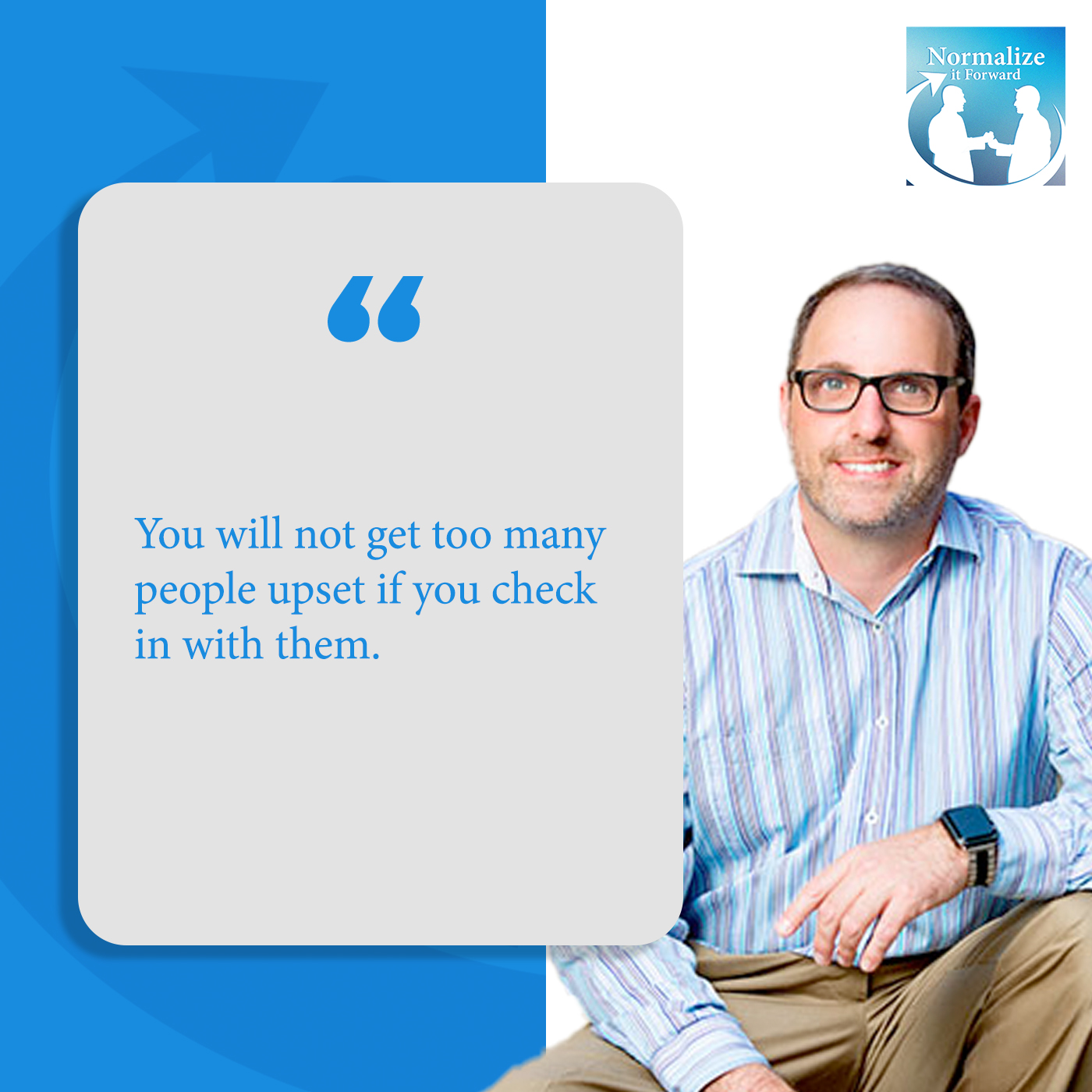
If people truly love and care about you, they will help you no matter what. They might not understand what you’re going through or they might not know how to help you, but if they truly love and care about you, they will. I have probably one of the biggest examples of that that young men fear. At 28 years old, I called my dad and he told me to be a man, figure it out, and rub dirt on it. It was stuff we’ve been told our whole lives.
I always share that story because within an hour, he realized that that was the wrong answer. He had never learned about mental health. He was an alcoholic and never addressed any of the stuff from losing his father at a young age or his alcoholism. About an hour later, he called me back and was like, “How can I help? What can we do?” That’s why if people truly love and care about you, they will help you.
My dad and I have conversations that we’ve never had before. I always end the phone calls with, “I love you,” to him, my mom, when I see my best friends, and when I see my neighbors. When you’ve gone through stuff like that, it changes your perspective. You’re so much more grateful for the people around you who are trying to help you.
Your perspective changes when you are more grateful for the people who are trying to help you. Share on XThey’re saving your life. When a person is that depressed, a nice comment or a negative comment makes a difference. Gaining a little bit of support and even checking in by text, like, “I’m here for you. Are you all good? What’s cooking? How have you been? Any of that is helpful for a person to receive. I love what you said. I hear about it way too often with parents. There is that mentality certainly from dads to sons, like, “Rub some dirt on it. It’ll be okay.” In my career, at least, I’m seeing and hearing that starting to change. You’re hearing more and more of the parent who didn’t grow up with conversation around mental health trying to understand it, which, to me, is remarkable. That’s pretty awesome.
Parents didn’t learn it. I’m 31 and I never heard about it in school from anyone. I remember the DARE program about drugs and alcohol. I remember the sex talk. I remember everything but being told about your mental health. If you don’t have your mental health, you have nothing. This is the most important, in my opinion, when it comes to your health.
I’m sure you experienced this with some of your younger patients. It’s encouraging to see how this new generation is talking about it. Probably from my age to 25 is maybe where we started to see the progress. Gen Z is leading the way. You can talk all the crap about them being on their phones too much, TikTok, and Snapchat, but they’re the first ones to tell you how they’re feeling or to offer help to somebody else, which is something that we can all learn from.
More Than Just An Athlete
On one hand, the statistics for that group are awful. The anxiety levels and the depression levels are as high as they’ve ever been. On the other hand, whether that’s propelling them or other things, they are way more open. I’m always impressed to hear peer-to-peer kids talking to each other about that stuff, which is awesome. The Mental Game makes me think of the concept behind how mental health plays into not just life, but athletic life. You’ve seen so much of that. I’m curious. If you were talking directly to a young athlete who’s been experiencing mental health issues, whether it be depression, anxiety, etc., and hasn’t done anything about it, what advice do you have to offer?
Everyone struggles. It doesn’t matter if you’re playing in the Super Bowl or you’re in your rec team at high school, or you’re playing on the AAU Basketball Circuit. Every person struggles. The thing that I hear from every athlete is that. Also, the sport isn’t you. It doesn’t define you. It’s what you do. It’s not who you are. It is knowing that your entire identity isn’t wrapped around what happens on Friday night or if you guys win the state championship, or if you get a scholarship to play in college. It’s a big part of your life, but that is not your life. You are more than just that athlete.
The sport does not define you. It is a big part of your life but it is not your life. You are more than just an athlete. Share on XThat’s the advice that I always try to give. Also, for anyone, the sooner you start having this conversation, whether it’s with your coach, your mom, someone you love, your best friend, or your teammate, the sooner you can help yourself and help each other. Offering that vulnerability and starting that conversation sooner rather than later saves so many lives because there are people like me, my dad, and millions that don’t talk about it until it’s almost too late. I would always suggest starting that conversation as soon as you’re feeling something. Don’t be scared of it. It’s okay. We all go through it.
It’s great advice. The V word, Vulnerability, is a tough one, but it’s super good advice. I heard you say, and it’s spot on, to find an adult that you can trust. There may be several. There are people out there that some young athletes won’t go to. Perhaps you have a coach that you know is not going to understand and maybe even limit your playing time if you go to them. That’s maybe not the person to go to. Find someone you can. It could be a teacher, a therapist, a neighbor, an aunt, or an uncle. It could be anybody in your world. Your point is a great one. Be vulnerable enough to say, “I need some help. I need to talk about something. I don’t even know what the heck’s going on, but I need to tell somebody.”
Something I always try to suggest is if you do have that coach that might not understand or the parent that you’re worried about telling, having that teammate, wingman, or whatever you want to call it, who can be that middle person that says, “Brandon hasn’t been himself. You don’t see this, but he is crying every night when he goes to bed. He is upset at school. You should listen.” Having that person maybe be that middleman to help get that point across can sometimes help. That person who’s not understanding finally goes, “I do need to listen.”
A Man’s Experience With Therapy
That’s a great point. Going back a bit, I’m curious. For a male in this world, the concept of coming into counseling is hard. A lot of people walk into my office, and they’re like, “I can talk to this guy. He’s a guy.” I use that sometimes with patients because I certainly understand that we process differently than women do. I’m curious as to what that was like for you when you got the courage and you’re sitting in this open room and you decided, “I got to open up.” Talk to us a little bit about what that was like for you as a male.
I’d never gone to therapy until 2020. I started going to therapy when everyone felt alone. Many people started going to therapy during the pandemic, but I wasn’t 100% open with my therapist about everything. I said that I had suicidal thoughts. I lied about maybe how recent they were or how bad they were. It finally got to two years later where I was at that rock bottom and I had no other choice. I wasn’t going to be alive if I didn’t ask for help.
I don’t want to get into the specifics of means, methods, and things that I struggle with myself, but I got to the point where I wrote a goodbye letter to my ex or my girlfriend at the time and my mom while stone-cold sober at 10:00 AM in the morning. That is when it went to me like, “This is the moment. I have to get help because I don’t know what else to do.”
That was pretty tough and traumatizing, from telling my employer to filing for disability to seeing what the hospital bill is going to cost and being there for two weeks. It was a very traumatizing experience, but I dove headfirst because I didn’t know there was no other option for me. It’s like anything in life. Once you see it work, then it helps you even if it’s small baby steps. You go to the gym and start to see, “I lost five pounds this month.” It’s the same thing for me when it came to seeing that therapy worked or starting my sobriety journey. Once you see the stuff work, pay off, and help you, it does help you flip that switch of, “This is good for me. I am better because of this.”
It’s not going to happen overnight. You’re not fixed in two weeks or fixed right away when you start therapy, but you learn these tools that we’ve started to talk about that you never heard of before. Once I got comfortable opening up, it did change the game for me. I do that where my whole life story is on the internet besides my ex’s name. It was weird at first, but I see how it can help people, whether it’s DMs that I get or people that come up to me at games or events.
I drove an Uber to try to make ends meet when I quit my job and when I started this. I’ll never forget this kid. He was half in the bag after being out for a night. It’s 1:00 AM and I’m driving him home. Out of nowhere, he starts reciting my goodbye letter that I posted. I was like, “I don’t even remember typing all of this.” On his phone, he was like, “That helped me six months ago when you posted that.” I was like, “That is crazy to hear.”
That’s powerful.
You don’t always see that. Sometimes, you can’t reach everybody. You do hear about things where people did take their own lives, or maybe they did resort to self-harm. That breaks your heart, but you try the best that you can to help anyone. Vulnerability, the big V word or whatever you want to call it, is the biggest thing that can help people because it makes you feel like you’re not alone.
That’s huge. That story about that young man was powerful. I’m so thankful that you tolerated that space, journey, and vulnerability because, one, it’s great to connect with you, but your effect and the ripple of what you’re doing is clearly touching a lot of individuals. When a person’s in that head space, they’re not thinking about the chapters that haven’t been read. They’re thinking about the chapter they’re in, and maybe this is the end.
I had a patient of mine years ago who worked with me for a while in his twenties. He was 27 or 28. He shared with me that he couldn’t believe that he had made it to 27 or 28, because at 21, he thought his life was done and that it was going to end. It’s that concept of like, “I need to now reconfigure. I’ve got all this world in front of me and all this space in front of me,” which is truly amazing. To your credit, I think about progress. When you lose some weight in the gym, that’s great, but this type of progress opens up your world and other people’s.
The thing that I always try to share are the two things that gave me that light and kept me going, and the biggest things that have helped me. Number one, do something when you’re feeling a certain way. When you’re sad, depressed, or suicidal, you have to be vulnerable and talk to somebody or reach out for help. Number two is what you’re getting at with that 27 or 28-year-old. At 21, I thought the same thing. I thought, “This is the end of the world. It’s never going to change.” Feelings are temporary. They don’t last forever. It’s a chapter in your life. It is not your life. It took me so long to get to that realization.
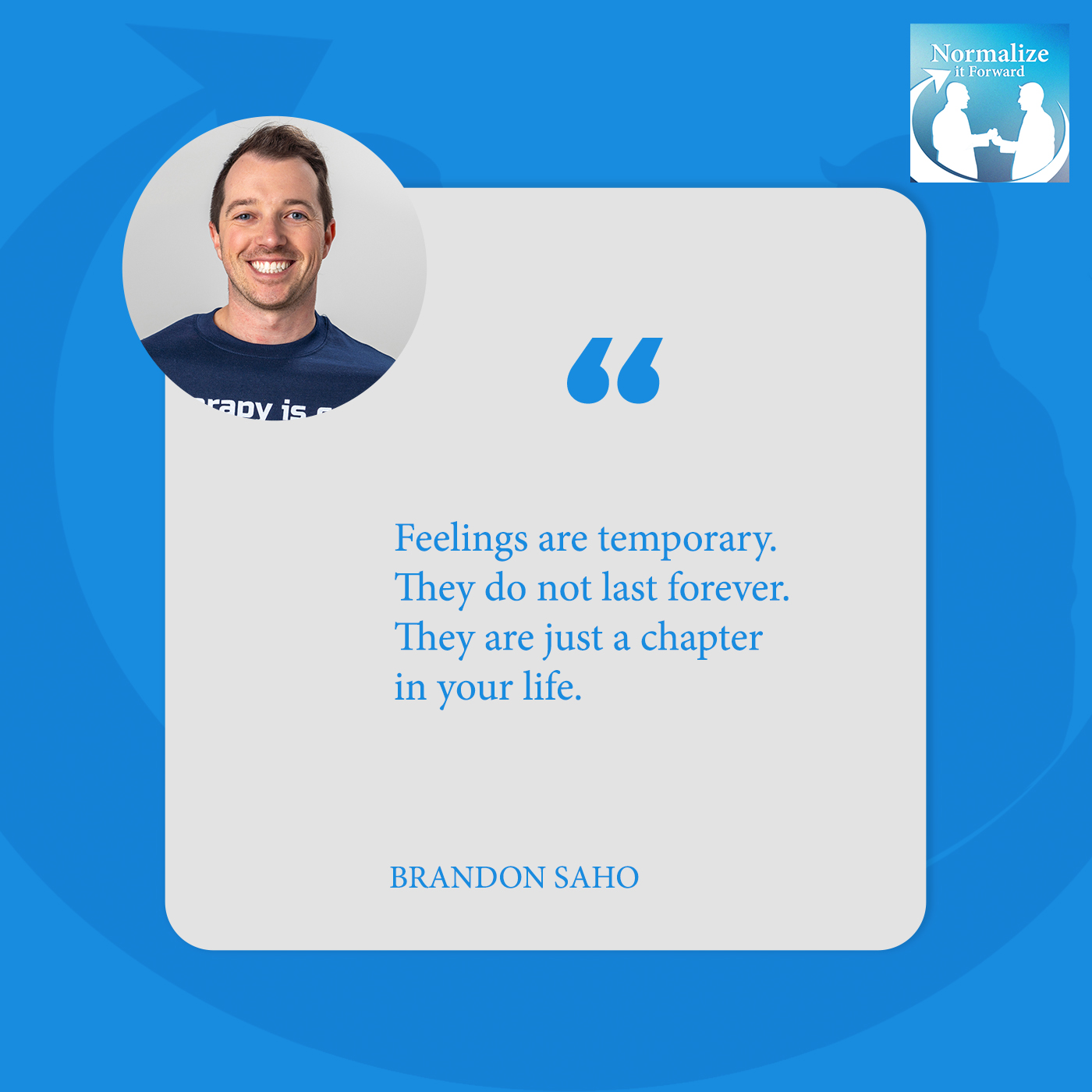
The feelings-are-temporary thing helps me with big-picture stuff. When it came to when I was suicidal, the daily stuff of like, “I got a cold right now. My studio flooded last night. I can be mad for ten minutes, but let’s do this interview. I’ll get back on some other meetings, and then I’m going to try to go for a hike.” You’ve got to have those thoughts that enforce that it’s not the end of the world.
Brandon’s Nominee For Next Guest
It’s a great point. Part of this show is that I ask my guests if they could think of a friend, a coworker, or a relative to nominate to keep the conversation moving. I would love to get your thoughts on that. Does anyone come to mind?
I had a lot come to mind. The one that hit home for me is Dayton Basketball Coach, Anthony Grant. He lost his daughter, Jayda, to suicide a few years ago. He’s the head coach at Dayton. She had been in therapy. There were warning signs. They were in the process of helping her as much as they could at that moment. I knew who he was, but I didn’t have any connection to him at all. He had reached out to me a few years ago, asking for any type of guidance to help his wife, Chris, who is amazing too, and wanting to connect.
They started Jay’s Light to honor her. Every year at Dayton, they host a mental health event town hall inside the arena, and then a charity basketball game where all the proceeds go to different mental health foundations in Ohio. A couple of years ago, they played Ohio State. In 2024, they played Xavier. It is strictly all about mental health. They play the exhibition basketball game, but every single time out, they show clips from The Mental Game on the screen. I was a part of the TV broadcast. They also have the individual players of both teams talking about how it’s impacted them.
For me, Coach Grant and his wife, Chris, are people that I would like to nominate because they are helping people. They’ve been through it themselves. Like a lot of us who have experienced that loss or been at that rock bottom, you find a way to help others because you don’t want anyone else to go through that. They truly are helping keep that conversation alive and keeping people alive.
Many people who have experienced loss or have been at rock bottom look for ways to help others so they will not go through what they went through. Share on XEpisode Wrap-up And Closing Words
That’s fantastic. What a wonderful organization they formed through a tragic event. I appreciate you putting that out there, nominating them. I look forward to connecting with them. I appreciate your time. I know you’re busy. I appreciate your honesty and genuineness. It takes a lot of courage for people to get up here and talk about themselves, but I know you’re doing it for a reason. I know you make that connection in your head of, “If one person reads this and they get some assistance, it’s all worth it.” Thank you. From my point of view, I appreciate you doing all of this.
Thank you for the same thing. I get the chance to host conversations and speak at colleges, high schools, and events. I might be able to help people connect the dots, but amazing mental health professionals, therapists, psychiatrists, and practitioners are the ones who are truly saving lives. I look at you guys as one collective group that is on this mission together. Without people like you, I wouldn’t be here having this conversation, so I couldn’t echo that more towards you. Thank you as well.
I appreciate it. It takes a village, that’s for sure. You got to a friend in me. We will stay connected and remain supportive of each other and our mission. Continue doing what you’re doing. I believe a lot in what you’re doing and everything that is behind The Mental Game. Good luck with everything in the future.
Thank you. Maybe we’ll see you next time.
I would love to do that. Thanks again. Have yourself a great day.
Thanks. You, too.
Important Links
About Brandon Saho
 Sports reporter Brandon Saho battled depression and suicidal thoughts for years before finally asking for help in 2022. After beginning therapy and checking in to a hospital, he found a new purpose in life to help others.
Sports reporter Brandon Saho battled depression and suicidal thoughts for years before finally asking for help in 2022. After beginning therapy and checking in to a hospital, he found a new purpose in life to help others.
Saho quit his TV job and launched The Mental Game where he hosts emotional interviews with athletes and celebrities. Guests include actor Terry Crews, former NFL star Chad “Ochocinco” Johnson, rapper Kevin Gates, The Office star Kate Flannery and many more.
Saho’s mission is to save lives with impactful conversations about depression, anxiety and mental health.

